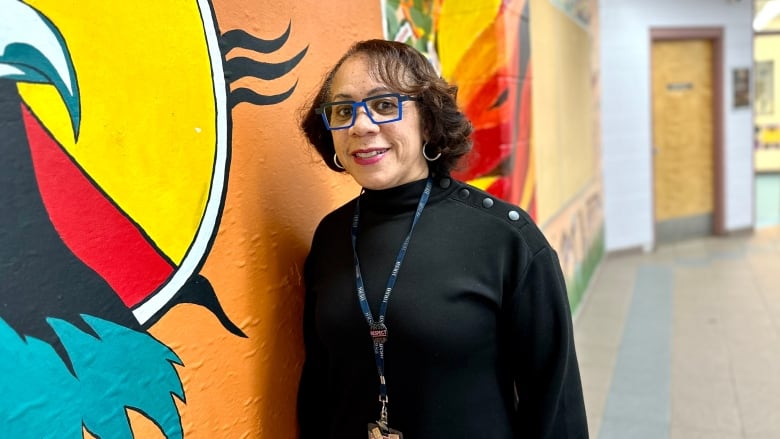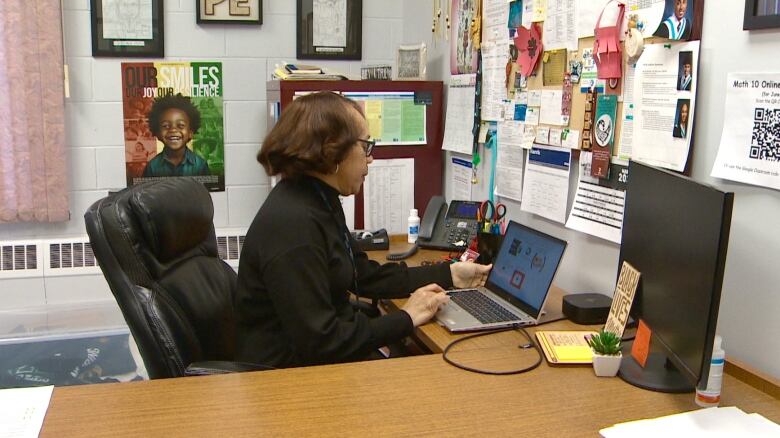This high school principal is breaking down barriers for racialized students
Nova Scotia's equity assessment on IPPs complete, but no timeline for public release

As the Nova Scotia government works to remove systemic barriers in theeducation system for Black and Indigenous students, one school leader is not waiting for marching orders.
Karen Hudson, principal at Auburn Drive High School in Dartmouth, N.S., has changed theway students at her school are placed on individual program plans (IPPs), which are developed for students who are not able to meet the provincial curriculum.
They are meant to be a last resort after all other supports and adaptations have been exhausted, but a 2016 review foundBlack and Indigenous students are disproportionately placed on IPPs, and in many cases, it was found the plan was not the most appropriate option for those racialized students.
"There's an opportunity to do better when you know better," said Hudson in a recent interview at her office.
"I want to make sure that all students feel that they are supported and that they can do whatever they put their mind to with the right support in place. That's the lens I come from."
The province launched an equity assessment of IPPs in June 2021 "to identify and remove systemic barriers in education," it said in a news release at the time.

The final report was originally expected in the winter of 2021-22. But three years after announcing the assessment, that report has yet to be released.
Hudson noted as that work carries on, all administrators in the Halifax Regional Centre for Education(HRCE) have now been trained to "disrupt" the IPP process and do their due diligence when considering whether to place a student on one.
But Hudson does feel her school staff is taking that mission to another level.
"That's the Auburn story, but hopefully it's trickling down to others as well because it's critical," said Hudson,who is embedded in the African Nova Scotian community and pioneered the first Africentric cohort in math and literacy within a public school.
She said not only do IPPs limita student's ability to continue their educationafter high school with some universities and colleges requiring students to upgrade courses before they would be admitted,or outright rejecting an application there is also a stigma it carries.
Developed with a team of people including school staff, parents and the student, IPPscan look very different depending on the subject and the student'sneeds.
One example would be receiving math or reading materials from a lower grade level, and sometimes being provided a secluded place away from their generalclassroom to complete that work.
Hudson's approach
Hudson said she takes a wide variety of factors into consideration when mulling whether an IPP is appropriate for a student their strengths and weaknesses, learning styles, socioeconomic and cultural backgrounds, and whether all other adaptations have been exhausted.
Adaptations can include things likeadjusting the length, complexityor timelines of assignments,using a visual timer to help the student manage time or using technology such as headphones.
Hudson said she also involves families throughout the entire process.
"So when you begin to dissect all those aspects, you see that there are students who have been marginalized," said Hudson.
"And if you haven't trained to change your mindset and critically think about what else can be done and you're saying this child is less than or this child cannot work to that level, that should not be the case because we have not done our part yet."
Only 16 students were on IPPs at Auburn last school year as of April, one of the lowest numbers out of all the high schools in the HRCE, according to figures obtained through access to information legislation.
In comparison, Woodlawn High, Sackville High andMillwood High threeschools of similar sizehad 33, 47and 52 students respectively on IPPs last school year.
Equity assessment is complete: province
Documents obtained through access to information legislation indicate the longer timeline of the equity report "is a result of further investigation and analysis into this program."
"This is a long-standing concern within African Nova Scotian and Indigenous communities, given the devastating consequences IPPs can have on youth in these communities," a February 2023note to the minister of education said, prepared by a senior government policy analyst.
"It's important not to rush this work and to ensure a robust evaluation is completed."
The Education Department declined CBC's request for an interview. In a statement, a spokesperson confirmed the report is complete, but there is no timeline for when the findings will be released publicly.
"We are grateful to the Office of Equity and Anti-Racism (OEA) for taking the time to get their assessment of the IPP process right," said spokesperson Krista Higdon.
"This work took some time as it required community engagement, and we are now taking the time to review findings."
Higdonsaid in the meantime, HRCE has developed a collaborative process with families, schools, program and student services staff, and diversity teams to ensure the most appropriate programming is in place for students.
"The most recent data shows HRCE has made progress in ensuring that any student of African or Mi'kmaw/Indigenous ancestry has rigorous learning opportunities, effective instruction, interventions and assessmentthat is rooted in inclusive practice before moving to the development of an academic IPP," she said.
'Part of our history'
Hudson said it's also paramount to involve families every step of the way, equipping them with the information they need to make the best decision possible for their child, particularly when it comes to Black families.
"Historically, families were not understanding what was happening in the education system because the education system was not always kind to Black families," she said.
"You have to give them the language so they understand that this is not the last thing that needs to happen."
Above all, administrators need to acknowledge that inequities existwithin the education system and put in the work to change that, she said.
"Take your time to get to know individuals, get to know their community, get to know your school, the community where it is. Get to know the people that come in here every day," said Hudson.
"We have to understand what we did wrong and correct that wrong.That's part of our history, but we want to change that history and make something that's been acceptable be unacceptable."
For more stories about the experiences of Black Canadians from anti-Black racism to success stories within the Black community check outBeing Black in Canada, a CBC project Black Canadians can be proud of.You can read more stories here.














_(720p).jpg)


 OFFICIAL HD MUSIC VIDEO.jpg)
.jpg)



























































































